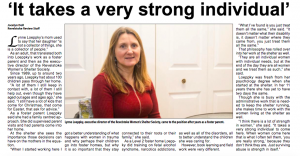By Jocelyn Doll, Editor at the Revelstoke Review, March 6, 2019.
Lynn Loeppky’s mom used to say that her daughter “is not a collector of things, she is a collector of people.”
As an adult, that translated both into Loeppky’s work as a foster parents and then as the executive director of the Revelstoke Women’s Shelter Society.
Since 1989, up to around two years ago, Loeppky had about 100 children pass through her home.
 “A lot of them I still keep in contact with, a lot of them I still help out, even though they have aged out ages and ages ago,” she said. “I still have a lot of kids that come for Christmas, that come for Easter, that ask for advice.”
“A lot of them I still keep in contact with, a lot of them I still help out, even though they have aged out ages and ages ago,” she said. “I still have a lot of kids that come for Christmas, that come for Easter, that ask for advice.”
As a foster parent Loeppky said she had a family centred approach. She did supervised parents visits and had parents come into her home.
At the shelter she sees the importance those decisions can have on the mothers in the equation.
“When I started working here I got a better understanding of what happens with women in trauma and why perhaps their children go into foster homes, but why it is so important that they stay connected to their roots or their family,” she said.
As a Level 2 foster home Loeppky did training on fetal alcohol syndrome, narcotics addictions, as well as all of the disorders, all to better understand the children she was caring for.
However, book learning and field work were very different.
“What I’ve found is you just treat them all the same,” she said. “It doesn’t matter what their disability is, it doesn’t matter where they came from, you just treat them all the same.”
That philosophy has rolled over into her work at the shelter as well.
“They are all individual women with individual needs, but at the end of the day they are all women and we treat them as such,” she said.
Loeppky was fresh from her psychology degree when she started at the shelter. In her 11 years there she has yet to have two days the same.
Though she is busy with the administrative work that is needed to keep the shelter running, she makes time to work with the women living at the shelter as well.
“I think there is a lot of strength in women,” she said. “It takes a very strong individual to come here. When women come here that is what I often tell them, ‘you are really strong,’ because they don’t think they are. Just surviving abuse is strength in itself.”